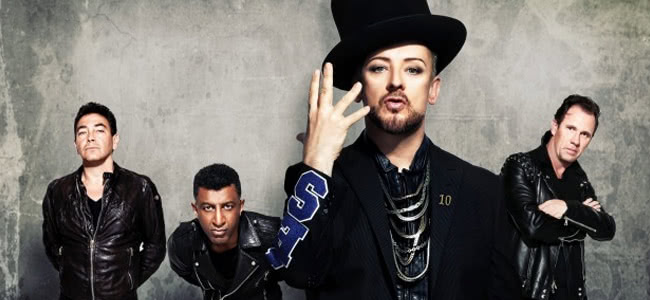As most of the world’s media ramped up their election coverage, media in New Zealand took a slight detour for a second to talk about Boy George. No, not some underdog independent candidate, the Boy George, frontman of ’80s phenomenon Culture Club.
Following concerns over whether the singer would be permitted in the country to embark on a new tour with his band, Boy George, real name George Alan O’Dowd, stirred controversy after he walked out of an interview with NZ journalist Toni Street.
Street had questioned the singer about his 2009 conviction for falsely imprisoning a male escort. As the Daily Mail reports, up to that point Street had found George to be “upbeat and entertaining” and the interview had been going swimmingly.
“I will open that can of worms when I am ready,” George later tweeted. “Not while things are going so well for me… I got more media from ending the interview. Job done.” But it’s difficult for George to escape that “can of worms”.
When the frontman was made a judge on the UK version of The Voice earlier this year, his victim in the 2007 incident, Audun Carlsen, slammed the BBC for hiring the pop star, calling him “a criminal who has been to prison”.
“The BBC should be ashamed of themselves for employing Boy George after everything he did to me,” Carlsen said, via NME. “He shouldn’t be allowed to be a mentor, they should axe him. He is a criminal who has been to prison.”
“If a male celebrity beat up a woman with a chain, handcuffed her to a wall and threatened her with a sex toy, there would be a public outcry if he was given a high-profile job at the BBC,” Carlsen insisted.
Despite this, the promoter of Culture Club’s NZ tour was confident all the members of the band would be permitted in the country. Speaking to Newshub, Stewart Macpherson explained that they’d already been to Australia, the Philippines, Japan, Canada, the United States, and Mexico in the last six months.
However, as Newshub note, NZ’s immigration officials aren’t averse to denying visas to controversial musicians, particularly those with a history of violence. Chris Brown, a convicted domestic abuser, was denied entry into New Zealand and Australia.
And there was also controversy when rapper Tyler, The Creator was denied entry into both countries amid accusations he incited violence at his concerts and promotes rape and violence against women in his lyrics.
However, Culture Club are currently looking forward to their New Zealand tour and they’re set to return to Australia next month for an encore tour after their June trek proved a mighty success.
Quite frankly, we’re not sure how to feel about this.
During a recent interview with music critic Anthony Fantano, the YouTube star questioned why Tyler, The Creator was banned from our country but a homegrown artist like Nick Cave is not only allowed to tour, but celebrated as a national treasure.
“What’s odd is that in the case of Nick Cave, he gets a pass because we understand what he’s singing is hyperbole or it’s just a story and when you sing about a certain topic that doesn’t necessarily mean you’re endorsing it,” Fantano told Tone Deaf.
“Whereas Tyler, The Creator didn’t get the same ‘benefit of the doubt’. I guess because he’s said some nasty things and wasn’t nice to the right people online, but I guess what I’m trying to say is it still doesn’t make the treatment he got any less unfair.”
It seems even less fair once you consider the artists that we give a free pass to tour Australia, even when their lyrics are just as incendiary and offensive as Tyler, The Creator’s and even when they have been accused or even convicted of violent and sexual crimes.
In the case of Boy George, his lyrics are perfectly innocuous, but his personal history should irk the members of groups like Collective Shout, who spearheaded the ban on Tyler, The Creator, insisting he was a ‘Controversial Visa Applicant’.
And yet, not only do activist groups and the media remain silent, George and his band are allowed to tour not once but twice in the same year. Should he be allowed to do so? Well, that’s the conversation that, for whatever reason, we’re not having.



































